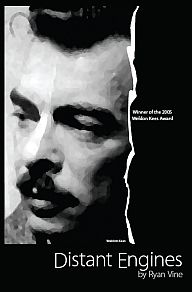Distant Engines: Threats and Joy
Connie Wanek reviews Ryan Vine's new book "Distant Engines." She finds his language "spare, evocative, audacious." Vine.will open the Spirit Lake Poetry Series on Saturday, Oct. 7, at 7:30 in Somers Lounge at the College of St. Scholastica in Duluth.

Ryan Vine’s new book, his first, won the 2005 Weldon Kees Award and appeared in April 2006 from Backwaters Press. It’s called Distant Engines, and reading it, we enter a world both thoroughly contemporary and ancient.
The title of the book is taken from a line in a terrific poem called “Homecoming,” which is set in the past, during the era of World War II. The poem describes a woman emerging from her home to see her husband fly over after a long absence:
Happiness, she thought,
is the low growl of distant engines,
the shadow of his B-25 (the biggest thing
to ever come down their streets)
wrapping over houses, yards flashing
as it passed across, coming closer.
The subject is as old as the Iliad—or, as old as the poems of Hsin Ch’i-chi or Wang Han who are invoked in the final poem of the book. Men go off to war, and their leave-taking is excruciating, and their homecoming is too, though in a much different way. The “growl of distant engines,” a threatening image, is, we are told, “happiness.” And it’s true.
The language in this poem and in others–spare, evocative, even audacious (consider the title “Good Ward Almighty”)–is early twenty-first century. A poem like “Scratch Ticket as Ars Poetica” has a very contemporary ironic, almost serendipitous quality, and a touch of humor.
Many of the poems in Distant Engines feature an old man named Ward, who is hanging around, staying alive “long enough/ for the bananas/ sitting on the sill/ to ripen.” Part sage, part drunk, part father, part amigo, part real and part myth, Ward meanders through the book, and his recurring presence, and the interplay between the persona of the poet and Ward, lend a narrative quality to Distant Engines.
Also, employing a character like Ward (and it’s a kindness, as one feels Ward may be on permanent disability and could use the work) frees the poet. Readers will be less likely to regard the poems purely as an expression of the poet’s personal feelings. Instead they can see that poems are made the way a bicycle is made, out of parts that the poet hopes will work well enough together to make the little machine operational.
The poems in Distant Engines are, in fact, fully operational. They are lean, direct, unsentimental, even gritty. We’re taken to the bars and ore docks, to the jetty, to a “Sunday night at Centerfolds,” out to Morgan Park and the steel mill, to an old downtown Duluth that’s more alive at midnight than it is at noon.
We spend a hard night out with these poems, but by morning we feel we’ve learned something not just valuable but essential: Life is difficult; poetry is required.
Ryan Vine grew up in Duluth, Minnesota, and after receiving an MFA at Emerson College, he returned to teach at the College of St. Scholastica. It’s wonderful to have this first book, and to look forward to many others.